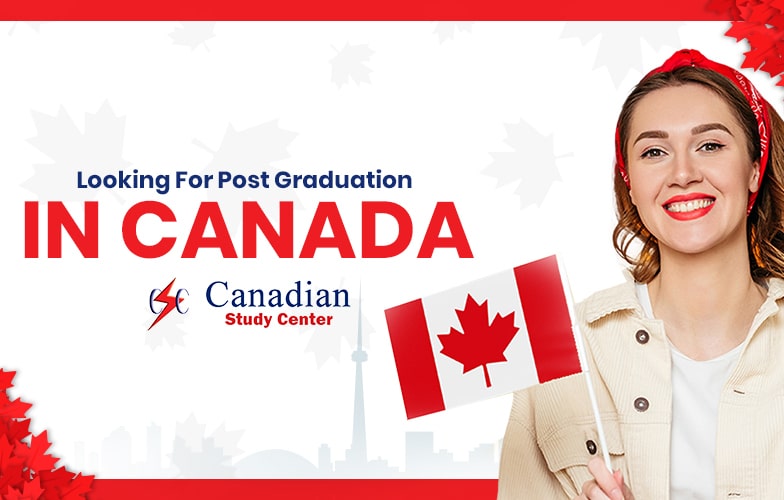Are you an international student looking to take your education to the next level with a postgraduate (PG) program in Canada? Look no further! Canada’s universities and colleges offer a wealth of opportunities for PG courses across various disciplines, from business and engineering to arts and sciences.
PG stands for Postgraduate studies, which typically refer to advanced academic programs pursued after completing an undergraduate (Bachelor’s) degree. These programs include Master’s degrees, graduate diplomas, and doctoral (Ph.D.) studies, offering specialized knowledge and advanced skills in various fields.
Known as the education hub of the world, Canada is very well known for post-graduate courses among international students. Every year thousands of international students apply for PG in Canada. Known for its liberal and multicultural environment, and world-class universities, Canada houses more than 6,00,000 students from all over the world.
In this ultimate guide, we’ll explore the best courses and institutions Canada has to offer, helping you navigate the process of choosing the right program and university or college for your academic and career aspirations.
Why Study Post Graduate in Canada?
There are many reasons why one should choose to study post graduate in Canada. Pursuing postgraduate courses in Canada offers several benefits that can significantly enhance your academic and professional journey.
1. Academic Excellence
Canadian institutions are renowned for their commitment to academic excellence, boasting world-class faculty and state-of-the-art research facilities. This environment fosters intellectual growth and innovation, providing students with the tools and knowledge necessary to excel in their chosen fields.
2. Diverse Programs
One of the most appealing aspects of Canadian postgraduate education is the diverse range of programs available. Whether your interests lie in engineering, business, health sciences, or the arts, you’ll find a program that aligns with your career aspirations. This variety allows students to tailor their education to their specific goals, ensuring a more focused and relevant learning experience.
3. Global Recognition
The global recognition of Canadian degrees is another compelling reason to choose Canada for postgraduate studies. A qualification from a Canadian institution carries significant weight in the international job market, opening doors to career opportunities worldwide. This recognition is a testament to the high standards and quality of education provided by Canadian universities and colleges.
4. Research Facilities
Canada’s reputation as a research powerhouse is particularly attractive for postgraduate students. The country’s commitment to innovation and discovery provides ample opportunities for hands-on research and collaboration with leading experts. This exposure not only enhances your academic experience but also prepares you for a career at the forefront of your field.
5. Quality of Life
Beyond academics, Canada offers an exceptional quality of life. Known for its safety, multiculturalism, and welcoming communities, Canada provides an ideal environment for personal growth alongside academic achievement. This balanced lifestyle contributes to a more holistic educational experience, allowing students to thrive both in and out of the classroom.
6. Welcoming Policies
Furthermore, Canada’s policies for international students are particularly favorable. The possibility of obtaining a post-graduation work permit allows graduates to gain valuable Canadian work experience, enhancing their employability both in Canada and internationally. For those considering long-term prospects, Canada offers various pathways to permanent residency for international graduates, making it an attractive option for building a future in a dynamic and inclusive society.
Therefore, choosing to pursue postgraduate studies in Canada means investing in a high-quality education that prepares you for global success while experiencing life in one of the world’s most livable countries. It’s an opportunity to grow academically, professionally, and personally in a supportive and diverse environment.
Colleges and Universities To Study PG Diploma In Canada
Many colleges in Canada offer postgraduate diploma courses. With various college and university options, you can choose the one that best fits your course of study and budget. These colleges and universities also offer various scholarships to deserving international students. There are two major intakes for admission to a postgraduate degree in Canada i.e., fall intake which starts in September, and winter intake which starts in January. However, the deadlines for each intake may vary from institution to institution.
- Durham College
- Sheridan College
- George Brown College
- Algonquin College
- Seneca College
- Humber College
- Confederation College of Applied Arts & Technology
- Centennial College of Applied Arts & Technology
- University of Toronto.
- McMaster University.
- University of Waterloo.
- Confederation College.
- University of Calgary.
- McGill University.
- George Brown College.
Eligibility Criteria For Post Graduate Course in Canada
There are certain eligibility criteria to be fulfilled in order to apply for a PG course in Canada. Some of the criteria are compulsory and some criteria depend on the college or university you are applying to. Here are some of the major admission requirements for post-graduate programs in Canada:
1. A Bachelors Degree
In order to be eligible to apply for a postgraduate in Canada, the applicant must have an undergraduate degree or equivalent from a recognized educational institution. To join a PG Diploma in Canada, a candidate should complete a relevant undergraduate degree with a cumulative score of at least 60%. Specific diplomas, especially the ones related to Project Management or Business Administration, sometimes may require candidates to have one to two years of work experience.
2. English Language Proficiency
Another criterion to be eligible for programs for post graduate in Canada is proof of English proficiency such as IELTS with a minimum band of 6 overall. For postgraduate courses, the applicants will require to obtain a minimum band of 6.0 in each section along with an overall IELTS score of 6.5 or above.
3. GMAT or GRE
Similarly, to pursue an administrative or specific business program such as an MBA, Master of Finance, etc., the applicants will require to submit their GMAT scores. Also, some programs might require scores for the GRE test. For scholarship, your language test result must be above 7. However, this highly differs from one university to another.
4. Work Experience
Generally, you don’t require work experience to apply to a graduate program or post-graduate diploma program. With the help of your undergraduate degree, you should be allowed admission. If you’re looking to get a scholarship to study in Canada, relevant work experiences or the one that showcases your leadership abilities could help up to a great extent. Possessing leadership ability is one of the major requirements for getting a scholarship in Canada. However, specific diplomas, especially the ones related to Project Management or Business Administration; may require applicants to have one to two years of work experience.
Best Courses for PG In Canada
Here are the top five post graduate courses in Canada:
1. Business Management
Master’s in Business Management (MBA) is one of the most popular post-graduate courses in Canada. You can choose from a wide variety of courses in Business Management. MBA degrees have many similar entry requirements, including GMAT/GRE scores, academic achievements, and evidence of language requirements. However, MBA entry requirements include a minimum amount of professional experience, usually at least two or three years and often more (especially for an Executive MBA).
MBAs are typically more expensive than other business degrees. An MBA in Canada can cost from US$60,000 up to as much as US$100,000, while an MA or MSc in Business is likely to cost less than this, in line with the general postgraduate fees charged by the institution.
2. Hospitality Management
A postgraduate degree in hospitality management is the best option for applicants who enjoy traveling, working with people, and making sure guests are having an overall great time. A master’s degree in Hospitality in Canada is a 1-2 year program that prepares the students for leadership positions in the hospitality and tourism industry. A postgraduate degree in hospitality management revolves around teaching students to develop business strategies for the tourism industry. Most Hospitality Management courses are offered as either M.A. (Master of Arts) or M.Sc. (Master of Science) degrees. Some programs are offered as Master of Business Administration (MBA) degrees. All of them normally takes 2 years to complete.
To be eligible to apply for a postgraduate course in hospitality management in Canada, the applicants must complete at least 2 years of undergraduate studies with a minimum of 75% and students with a Pre-master degree should have a minimum of 75% percent in their pre-master.
3. Health Science
Postgraduate in health science, also known as Master of Health Science (MHSc) degree is designed to give the graduate strong clinical research methodology skills that can be applied to their academic and clinical interests. The program is adapted towards students who have an MD or equivalent (e.g., dentistry or veterinary medicine), and want to gain skills in applying epidemiological and statistical methods to evaluating and conducting clinical research.
Canadian colleges offer ample health sciences and technology programs such as Occupational Health and Safety, Radiation Therapy, international healthcare initiatives, and population health, and so on.
4. Information Technology
Universities in Canada offer Master of IT programs for recent graduates from a related Bachelor’s program, or returning students with experience working in the field. Areas of study that are often central to a Master of IT curriculum in Canada include Database management systems, Programming languages, Software Engineering, E-commerce, Data communication, Computer security, Networks, Graphics, Web development, Embedded systems, and more.
Master of IT programs in Canada offers a part-time, full-time, online, or distance learning format, and thus can range in duration from a year to two or more. It is a good idea to contact the university in Canada about any Master of IT program for more information using the form on this website. Upon graduation from a Master of IT program, degree-holders will find their skills are in high demand in the global marketplace, in Canada, and abroad.
5. Science and Engineering
Colleges and universities in Canada are also very popular for their post-graduation courses in science and engineering. A Master of Arts or Master of Science degree is a graduate-level course of study that typically requires more rigorous and focused work than an undergraduate degree. Students may pursue this education to deepen their understanding of topics learned in undergraduate school or to train for a specific career field.
The procedure for accrediting an engineering program is undertaken by the Canadian Engineering Accreditation Board (CEAB), a working Board of the Engineers Canada (EC).
Conclusion
If you are planning to pursue your post-graduate programs in Canada from Nepal, do contact Canadian Study Center. If you have any other queries regarding study and work in Canada, please feel free to schedule a consultation meeting with us. We’ll definitely guide you in the right direction. . Our services include visa counseling, application processing, test preparation classes, documentation guide, and pre-departure orientation session. We will also assist you in finding a suitable province in Canada as per your program, interest, and attachments. We provide specialized visa counseling services for students willing to study in Canada from Nepal.
FAQs on Postgraduate Courses (PG) In Canada
1. What is the cost of PG in Canada?
The cost of PG courses in Canada vary by program and institution. Generally, tuition fee for international students ranges from CAD 15,000 to CAD 35,000 per year.
2. What is the duration of post graduation in Canada?
Typically, PG programs in Canada range from 1 to 2 years, depending on the program and institution.
3. What is the requirement for a postgraduate in Canada?
The requirements for a PG in Canada include a relevant undergraduate degree, proof of English proficiency (like IELTS or TOEFL), letters of recommendation, statement of purpose, and sometimes work experience.
4. How much GPA is required for PG in Canada?
Most programs require a minimum GPA of 3.0 on a 4.0 scale to study PG in Canada. Some competitive programs may require higher GPAs also.
5. What is the salary after PG in Canada?
Salaries after a PG in Canada vary widely by field and experience. On average, postgraduate graduates in Canada can expect to earn between CAD 50,000 to CAD 70,000 annually, depending on the profession.
6. What is the minimum IELTS score for Canada PG?
Typically, a minimum overall band score of 6.5 with no band less than 6.0 is required for admission to most PG programs in Canada.
7. Which PG degree has the highest salary?
PG degrees having job demands with highest salaries are in fields like engineering, computer science, finance, and healthcare (especially with specialization. These PG programs tend to offer higher salaries post-graduation in Canada.











